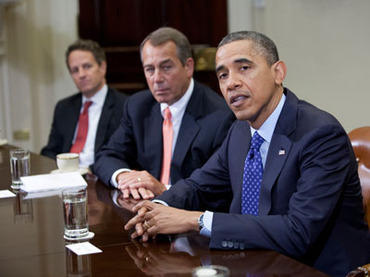
With only hours left until the end-of-year fiscal cliff deadline, Congress is not expected to make a deal regarding the fiscal cliff.
Only hours after President Barack Obama and leading members of Congress said on Monday afternoon that a deal between lawmakers was within reach, reports out of Washington suggest that a compromise will not be made before the new year. Bloomberg News and CNBC both reported eight hours before the 12-midnight deadline that no vote would be made before the end of the year.
If the fiscal cliff can’t be averted, there will be a lot in store for the new year. Taxes will go up, spending will go down and the limit on how much money the United States can borrow will once again be maxed out.
For starters, just about every working American can expect to see changes in their paycheck in 2013. If a deal isn’t cut on Capitol Hill before January 1, payroll taxes will increase across the board by two full percentage points, at least for the first $113,700 of income earned. Payroll taxes will rise instantly from 4.2 to 6.2 percent, snipping a substantial amount of money from every middle- and lower-class worker’s paycheck starting right away to help save the country from default.
Even those who don’t need to work will be asked to endure some austerity policies, too: Americans earning high wages will be asked to pay all new taxes to cover the cost of Pres. Obama’s hallmark health care legislation, and Capital gains and qualified dividends will be subject to higher fees, as well.
Those already without work won’t be having it any easier, either. Extended unemployment benefits will be over instantly for around 2 million residents, effecting many of the Americans on the lookout for work but unable to find any — currently around 7.9 percent of the labor force. Additionally, those looking for assistance will be subjected to a scaled back entitlement program, with funding for Medicare expected to be trimmed by around one-third.
The unemployed, of course, won’t be the only Americans pinching pennies. Should Congress fall to act in time, federal spending will see some significant changes. Also inevitable if the Senate and House can’t hold it together are billions of dollars in defense spending being stripped away. In all, sequestration would trigger around $1.2 trillion in automatic cuts, with an estimated $55 billion being taken out of the Pentagon in just 2013. During the next decade, the military would miss out on around ten-times that amount.
“If they are allowed to occur as currently scheduled, the long-term consequences will permanently alter the course of the US economy’s performance, changing its competitive position in the global economy,” Dr. Stephen Fuller of George Mason University and Chmura Economics and Analytics determined in a report on sequestration earlier this year. According to those researchers, more than 2 million Americans will see their jobs eradicated in just 2013 because automatic spending cuts will make their jobs essentially obsolete.
Of course, tax hikes aren’t imperative and the military budget might be saved from a severe slashing. Democrats and Republicans in halves of Congress are trying to come to an agreement that will see lawmakers making serious sacrifices in order to keep the country afloat during a time of tremendous fiscal turmoil.
“Analysts expect that the austerity crisis will weaken the economic recovery and quite possibly plunge the United States back into a recession,” the Washington Post reports this week.
Back in June, Federal Reserve Chairman Ben Bernanke warned that Washington lawmakers would have until the end of the year to iron out a deal or suffer some seriously grim consequences.
“The so-called fiscal cliff would, if allowed to occur, pose a significant threat to the recovery,”Bernanke warned. “If no action were taken and the fiscal cliff were to kick in in its full size, I think it would be very likely that the economy would begin to contract or possibly go even into recession, and that unemployment would begin to rise.”
That was six months, though, and senators and congressman have but only a few hours before the new year arrives.
Speaking from the White House Monday, December 31, Pres. Obama offered an early afternoon address that seemed to suggest a deal was almost all set.
“Keep the pressure on over the next 12 hours or so,” he said. “Let’s see if we can get this thing done.”






























